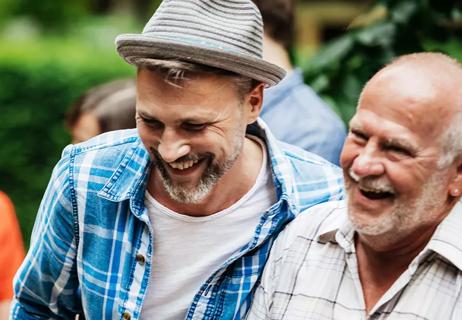Guide them to experts while being supportive, loving and patient

Someone you care about is finally seeking sobriety after years of alcohol use or drug use. Whether it’s a partner, child or close friend, you’re desperate to help.
Advertisement
Cleveland Clinic is a non-profit academic medical center. Advertising on our site helps support our mission. We do not endorse non-Cleveland Clinic products or services. Policy
So, what should you do and — maybe just as importantly — what shouldn’t you do? Here are some things to keep in mind as their journey begins, says addiction psychiatrist Akhil Anand, MD.
What’s the most important thing you can do when someone close to you takes a step toward sobriety? “Offer unconditional love and give positive affirmations,” says Dr. Anand. “Those things matter.”
Here’s what to do after that.
Help your friend or loved one find the best licensed professional or recovery program they can — and then step out of the way and let them move forward.
“Work with them to find a focused, targeted, evidence-based intervention,” advises Dr. Anand. “Get them to the people who know how to help. That’s productive for them.”
Understand that others may be better positioned to talk to your friend or family member about addiction. The same advice you gave for years may only be truly “heard” coming from an expert or someone else dealing with an addiction.
In many ways, the friends your loved one meets in self-help programs like Alcoholics Anonymous or Narcotics Anonymous are often in a better place to encourage them and lead them toward their sobriety.
When you love someone, you can’t help but be affected by their alcohol or drug misuse. It’s easy to become enmeshed — to be unsure where their life ends and yours begins.
Advertisement
An addiction mental health worker can help you understand the full impact of addiction on the family. Learn to separate what you can control from what you can’t — and take better care of yourself.
“Often, I tell my patients’ families to see a therapist, too, because they also need that support system, especially if there are derailments in their loved one’s recovery,” says Dr. Anand.
Help is out there for everyone affected by alcoholism and addiction. Programs like Al-Anon, Alateen and Families Anonymous can help you realize that you’re not alone in your situation. They offer opportunities to learn from others’ experiences, strengths and hope.
Support and therapy can help you set healthy boundaries with your friend or loved one, too. Working through your own feelings can help you be calm, collected and reassuring — yet firm — when talking to them, and that’s what they need.
Remember that treating an addiction is treating a brain disorder. It’s not an easy fix, like putting a bandage across a small wound. Treatment is a complicated journey — and it’s rarely a smooth one.
A few days in a hospital or a month at a rehabilitation center brings no guarantee of long-term success. Some studies show that relapse rates exceed 85% within a year of treatment.
“Addiction treatment is rarely a one-and-done step,” notes Dr. Anand. “It may take 10 times or more for people to really make progress, and that can be very hard on those close to them.”
There’s no such thing as a “cure” for an addiction, cautions Dr. Anand. Instead, someone simply tries to learn to live with the chronic disease. “There can be setbacks,” he says. “That’s the reality of the situation.”
Communication is key when someone with an addiction to alcohol or drugs is trying to kick the habit. But it needs to be the right kind of communication, stresses Dr. Anand. You can’t go into the situation thinking you can make someone stop their harmful actions.
So, when talking to someone about their addiction and how to overcome it, don’t:
Dr. Anand also cautions against enabling bad decisions by someone with an addiction: “Enabling is a dysfunctional behavior that shields folks with addiction from the consequences and pain that they develop from their addiction,” he says.
If there’s one thing you’ll need above all else as someone you care for goes through addiction treatment, it’s patience. The process is a marathon, not a sprint.
Advertisement
“Be prepared for it to take some time,” says Dr. Anand, “and just do your best to be supportive. But also don’t lose hope — people do get better.”
To hear more from Dr. Anand on this topic, listen to the Health Essentials Podcast episode, “How to Help Someone with an Alcohol Addiction.” New episodes of the Health Essentials Podcast publish every Wednesday.
Advertisement
Learn more about our editorial process.
Advertisement

When you’re dependent on a substance, your body relies on it to function; when you’re addicted to a substance, you continue to use it despite negative consequences

Genetics may increase your risk of a substance use disorder, but that doesn’t mean it’s fated

Maintaining hope and positive behavior during a pandemic

It isn’t a recognized mental health disorder, but research shows that problematic social media use can negatively affect your mental health, self-esteem and sleep

Alcohol is a depressant and can interfere with your sleep, mood and more

Your tolerance decreases with age, thanks to body changes, health conditions and medications you may take

Heavy drinking can cause both short- and long-term effects, including erectile dysfunction, ejaculation issues and low libido

Popular among teens, these inhalants give you a quick high, with serious harmful effects

Start having sex about 72 hours before ovulation, then at least every other day during your fertile window

Attachment theory suggests that your earliest relationships shape connections throughout your life

It isn’t a recognized mental health disorder, but research shows that problematic social media use can negatively affect your mental health, self-esteem and sleep